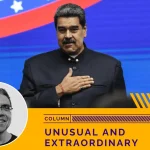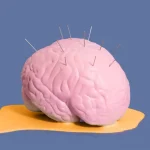From left to right: Eulogio del Pino, Tareck El Aissami, Rafael Ramirez, and Nelson Martinez, all former PDVSA presidents who have been accused of and prosecuted for corruption charges. Photo: Tal Cual.
By Clodovaldo Hernández – May 4, 2024
We hear and read about thefts and mega-thefts of public assets and we ask ourselves a question that may seem naive or stupid: why can the control mechanisms, which are many and diverse, not prevent it?
Well, let us try to find an answer that is neither naive nor anything like that. To do this, we will use some clichés and jargons from our political and journalistic lexicon.
Society of accomplices
Let us start by stating that the recent PDVSA-Crypto plot has shown us what was once called “a society of accomplices,” which from what we can see is more valid than ever. That expression, coined by the late [journalist and politician] José Vicente Rangel, began to be used in reference to crimes in which people who belong to various social strata, organizations, parties and companies participate, that is, the entire society is involved or affected in one way or another.
As for the case at hand, corrupt officials at high positions of responsibility and power in the Venezuelan government made pacts with corrupt and traitorous leaders of the far-right opposition, with the intermediation of corrupt business owners of the old or the new guard, and US diplomats without a hint of moral scruples. Pacts orchestrated in this way can remain in a perturbed equilibrium, based on the fact that no one wants or can accuse the other.
Automatic solidarity
Another common phrase that dates back to the first cases of corruption during Puntofijismo [“two-party system” that existed in Venezuela since the fall of the Pérez Jiménez dictatorship until Hugo Chávez’s ascension to the presidency] is “automatic solidarity.” In the Fifth Republic this has been a core factor in the actions of high-profile thieves, so much so that even the top leaders of the ruling United Socialist Party of Venezuela have recognized that they engaged in this conduct, by which they contributed to the impunity of former officials accused of very serious acts of corruption, with Rafael Ramírez being the most prominent case, although, surely, not the only one.
Automatic solidarity has, on several occasions, had a kind of bonus track, a scam: certain figures reported for crimes against public property were not only not subjected to the necessary investigation, but they were also given more power, which emboldened them and made them feel indestructible and unassailable. And here it is pertinent to paraphrase the third cliché: the one who had the reputation of being a fox in the henhouse.
The “right-hand men”
The formation of mafia structures has been fundamental in ensuring that criminal networks operate for a long time without punishment. The ringleaders always have “right-hand men,” assistants and advisors who impose themselves on the entire organization of the looted public entity, either through the tactic of adding officials of various ranks to the corruption plot, or by expelling or “freezing” employees who are critical and, if necessary—they are mafia, after all—threatening, blackmailing or extorting a possible “snitch.”
As the gangster clan is transversal to the state, that is, it is not limited to one organization itself, but rather branches out to various instances of the government and encompasses others in the administrative sector and the judiciary, the threats and blackmail are expressed through a modus operandi that includes police officers, prosecutors and judges who are also corrupt. A fearsome machinery.
The timid or non-existent functioning of internal comptrollers is explained in this way. When searching for its origin, it is found that it has to do with all of the above: if the person in charge of auditing, supervising and sanctioning illegal behavior is appointed by the powerful boss, by one of the mafia leaders or by some “right-hand man,” that is, if the comptroller belongs to the fold of the corrupt, what can he be expected to do?
Nor does it help much if the auditor, supervisor or comptroller lacks the experience and knowledge that the corrupt have, who are definitely brilliant in their machinations. We must not forget that these are crimes of cunning, not simple dabbling in the cash register drawer.
On the other hand, when a comptroller or auditor does have that ability and detects irregularities, but is threatened, blackmailed or extorted, he will not make public or take the complaints to court unless he is willing to sacrifice himself, and no one can be asked to have that vocation of a martyr.
Social oversight
Thus we arrive at a point that, in theory, should have distinguished the Fifth Republic from the Fourth: the weight of social oversight. It should have detected it, but it has not done so because the corrupt have managed to silence it through the methods already described.
Those who cannot be bought or incorporated into the feast of the corrupt, they are intimidated by the mafia with its political power and partisan influence. The mafia “judicializes” this person, that is, it searches for any misconduct or invent a criminal case to put this person in jail. He is defamed publicly, in spectacular press conferences; or the mafia boss sends subordinates specialized in threats to wait for him on a dark night.
It is clear that if you are requested to report alleged irregularities and, when you do so, you end up fired, imprisoned, slandered or beaten, what desire can you have left to contribute to the administrative health of the country?
The role of media and social media platforms
If we want to carry out a more or less exhaustive analysis, we must also study the role that the media and prominent figures on social media platforms have played (or failed to play) in the fight against corruption.
The mainstream press and right-wing influencers have lost part of their credibility by insisting on making unsubstantiated complaints, launching fake news or recycling them from international media and acting as operators of anti-national sectors, following imperialist orders, or motivated by the personal hatred of the editors and journalists.
On the side of the public media and many pro-Chavismo influencers there has been automatic solidarity, blind defense, and self-censorship. Ironically, it is these media and individuals that put more power into the punches when a former official, whom they previously defended, officially falls from grace.
Mafiosi have always known how important it is to have allies in the media (and, for some time now, in social media) and that is why they allocate a “budget” of their ill-gotten funds to bribe, buy silence, or get mentioned only in a positive light. Some outlets and wannabe-outlets in social media have been created expressly to suck resources this way. It is mercenary journalism 2.0.
The godfather’s mafia empire
All this immersion in the sewer of the PDVSA-Crypto case has also shown us an enormous truth: imperial power is corrupt par excellence and one of the causes of the rise of administrative depravity throughout the world, both through the US government and US corporations, which bribe left right and center in their own country and, above all, outside of it.
The United States government is structurally kleptomaniac, as many officials, including former US presidents, have confessed. Venezuela, in the current situation of blockade and unilateral coercive measures, has been robbed of “even the cheese that was on the table.” Beyond the anti-imperialist discourse on paper, we must conclude that in the brothel of Venezuelan corruption, the United States is the madam.
The intricacies of the case make it clear that the United States encourages corruption of both its allies and its adversaries in Venezuela. It knows that it is easier to subdue a society if it is in moral ruin because everyone who is involved in these machinations has to obey the empire and follow its orders.
Like the authentic mafia godfather, the fake US ambassador Story had Julio Borges as his errand boy who, with his prim stuck-up lawyer voice, fulfilled the mission of threatening his equivalent on the side of Tareck el Aissami, Samark López. If the results of his good offices were not seen, the godfather was going to put a price on López’s head. The message is clear: if you work for me, you can steal what you can and nothing will happen to you, but if you follow your own conscience, I will file a lawsuit against you for money laundering and put your photo on a “wanted” poster. Double standard is another commonplace jargon that describes very well what is happening.
US agents can analyze very well who is who in the structure of the Venezuelan state to determine which individuals have a weakness for money, wealth and the luxuries of the life of millionaires and celebrities. It is not a difficult task because these characters are exhibitionists, display-mongers and wasteful. But that is an aspect of the topic that we will not discuss today. These agents lace them up without difficulties, put them at the service of the godfather’s empire, and turn them into a negotiable product because, as my friend Gilberto Rivero says, “he who buys you, sells you.”
Borges, Ocariz, López, and Vecchio Part of the PDVSA-Crypto Plot (+Washington Link)
The Anti-Blockade Law
The cases of looting of public resources in the last ten years have happened amid the waves of the blockade and unilateral coercive measures that have sought to overthrow the government of President Nicolás Maduro. With the United States as the mastermind and a group of traitors as necessary accomplices, a legal device was invented to assist the opposition to loot public companies, assets in cash or gold, bonds, airplanes, and even ships loaded with gasoline. This is something unprecedented because robberies on that scale could only be carried out from inside the government.
In the midst of the great disruption that the launching of the criminal blockade and the so-called sanctions has meant, a survival mechanism called the Anti-Blockade Law was designed by the Venezuelan government. But, since the corrupt people are cunning, and part of cunning is taking advantage of the opportunity, the cunning white collar criminals in red shirts utilized the law to carry out an orgy of stolen money.
Being corrupt always means stealing from your neighbor, from your compatriot, which is reprehensible in any circumstance. But there are cases in which this behavior is even more abominable, for example, in the midst of a national emergency when money intended for the most vulnerable is robbed or, as in this case, when the country’s income had fallen to almost zero. This is the sort of actions that, using another popular saying, have no forgiveness from god. But again, that is a separate topic.
Wash dirty linen at home
Let us end, for now, this walk through the museum of corruption with a very current aspect. It is the influence of electoral calculations on the public handling of scandals. In the past, the argument has been reiterated that airing these types of issues close to the elections can harm the campaign strategy, which is why it was advised not to do so, and to postpone any action in this regard. In extreme cases, it was suggested to do it behind closed doors.
Here we see coming another of those linguistic wild cards that abound in political speeches: you have to wash dirty linen at home. And not at just any time, but only when it is convenient.
Unfortunately, this method has done nothing for house cleansing. Rather, it has been a subterfuge to hide that rotten rag, which makes the house give off an unbearable stench.
With Operation Caiga Quien Caiga [PDVSA-Crypto case], which began in 2023 and which got a new impulse this year, it seems that the focus has changed diametrically and that we are going to face a final stretch of the electoral campaign in which this will be a central topic of the open-air debate. That, in itself, would be a huge step forward. We will see.
Translation: Orinoco Tribune
OT/JRE/SC

Clodovaldo Hernández
Venezuelan journalist and writer. He writes regularly for La IguanaTV, Supuesto Negado, and Mision Verdad.
- July 4, 2024
- January 15, 2024




